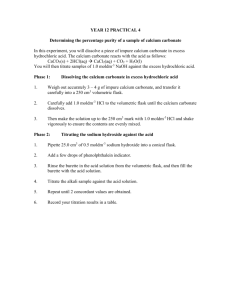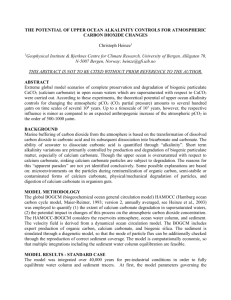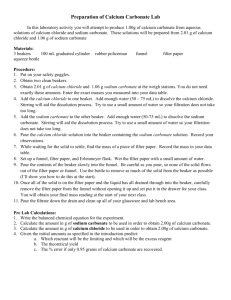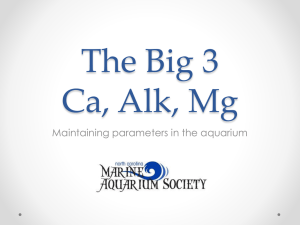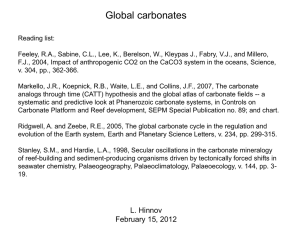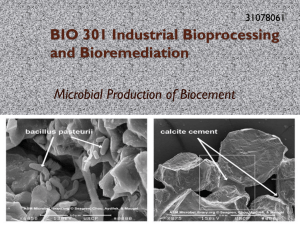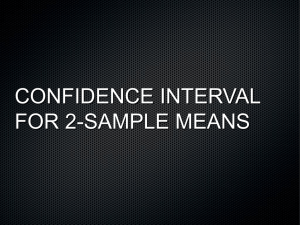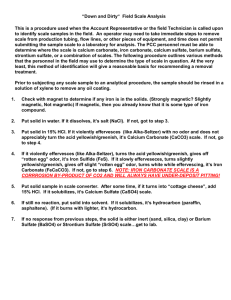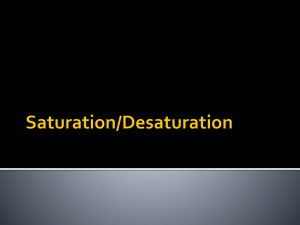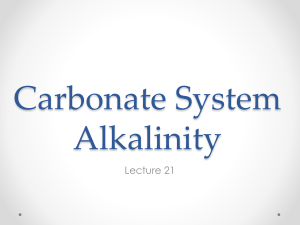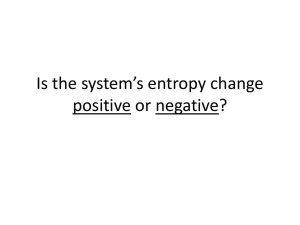Calcium carbonate saturation lecture
advertisement
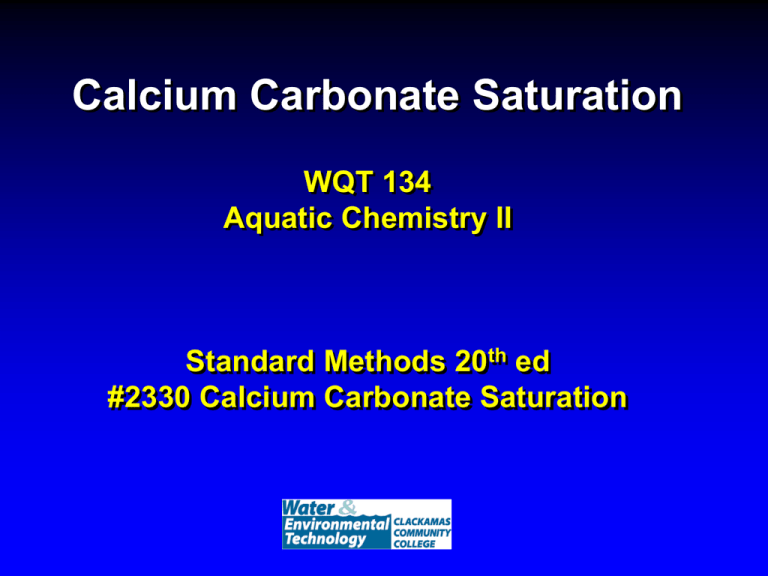
Calcium Carbonate Saturation WQT 134 Aquatic Chemistry II Standard Methods 20th ed #2330 Calcium Carbonate Saturation Week 5 Objectives Reading assignment: American Public Health Association (APHA), American Water Works Association (AWWA) & Water Environment Federation (WEF). 1999. Standard Methods for the Examination of Water and Wastewater, 20th edition 1. Understand the function of the marble test 2. Understand the role of calcium carbonate saturation in corrosiveness. 3. Understand how to measure calcium carbonate saturation (SM #2330) Calcium Carbonate Saturation WQT 134 Environmental Chemistry II STM. 20th edition. #2330 Calcium Carbonate “Marble Test” Experimental Design Part 1 Standardization of Titrant (Sulfuric acid)=purchased from Hach! ml pH 0.2 7.0 0.4 7.4 0.8 7.1 1.5 7.2 3.5 8.0 Part 2 Titration for Total Alkalinity determine determine p alkalinity T Alkalinity mg/L as CaCO3/L pH above 8.3 = P alkalinity color change 0.02 N Sulfuric acid P alkalinity Blue Color change after addition of Bromcresol green/methyl red 3.8 Part 2 ADD 0.5 g CaCO3 + redue! 8.3 200 ml of sample + 5 drops Phenolphthalein indicator no color change Palkalinity =0 or titrate to pH 8.3 pH 4.5 = T alkalinity red color change endpoint T alkalinity + 5 drops Mixed bromcresol greenpH Met4er stir bar methyl red titrate to pH 4.5 stir plate Calcium Carbonate Saturation #2330 What is Calcium carbonate saturation? •The sample pH and total alkalinity are determined. Then the sample is saturated with calcium carbonate and the procedure is repeated. A comparison of the before and after values is done by subtraction to determine if the system is under saturated, saturated, or in equilibrium with calcium carbonate. Why do we care? •This test helps to determine how much lime or soda ash are needed to keep a distribution system in good operating condition Calcium Carbonate Saturation #2330 Why is it important in wastewater industry? the corrosiveness of the water leaving the plant. Why is it important in water industry? Aesthetic taste of water and to prevent corrosiveness of lines. Calcium Carbonate Saturation #2330 What are some assumptions in procedure? •View procedure as a qualitative guide to the behavior of CaCO3 in aqueous systems Calcium Carbonate Saturation #2330 What are some interferences in procedure? •Deposition from oversaturated waters is inhibited by the presence of phosphates (particularly polyphosphates), certain naturally occurring organics, and magnesium Calcium Carbonate Saturation #2330 Calculations and Formulas? Step 1 Calculate pH(1) of original sample Step 2 Calculate alkalinity alk (1) of original sample Alk(1) T Alkalinity mg/L as CaCO3/L= (ml of acid to 8.3=colorless+ ml to reach pH 4.5=pink)(Normality)(50mg/meq CaCO3)(1000 ml) ml of original sample volume Step 3 Calculate pH(2) of 0.5 g spiked CaCO3 sample Step 4 Calculate alk(2) of 0.5 g spiked CaCO3 sample (ml of acid to 8.3=colorless+ ml to reach pH 4.5=pink)(Normality)(50mg/meq CaCO3)(1000 ml) ml of original sample volume Calcium Carbonate Saturation Calculations and Formulas? A= samples prior to saturation B= samples after saturation Eq 1: A-B= Stability Index Eq 2: Alk(1)-Alk(2)= +, -, 0 Eq 3: pH(1) – pH(2)= +, -, 0 Step 5 A>B- water is supersaturated with respect to carbonate and ma forma precipitate scale A<B water is undersaturated with respect to carbonate and ma be corrosive A=B water is in equilibrium with respect to carbonate constituents Calcium Carbonate Saturation #2330 Tips and Suggestions? 1. Use ample sample volume (300 ml); its trial and error 2. Leave the lime behind 3. Add H2SO4 slowly! 4. Keep track of H2SO4 added each time! 5. Rely solely on indicators or can use pH probe!
